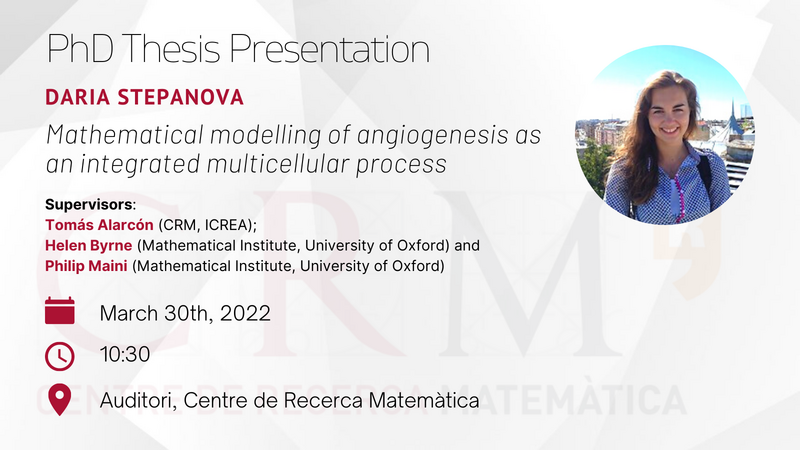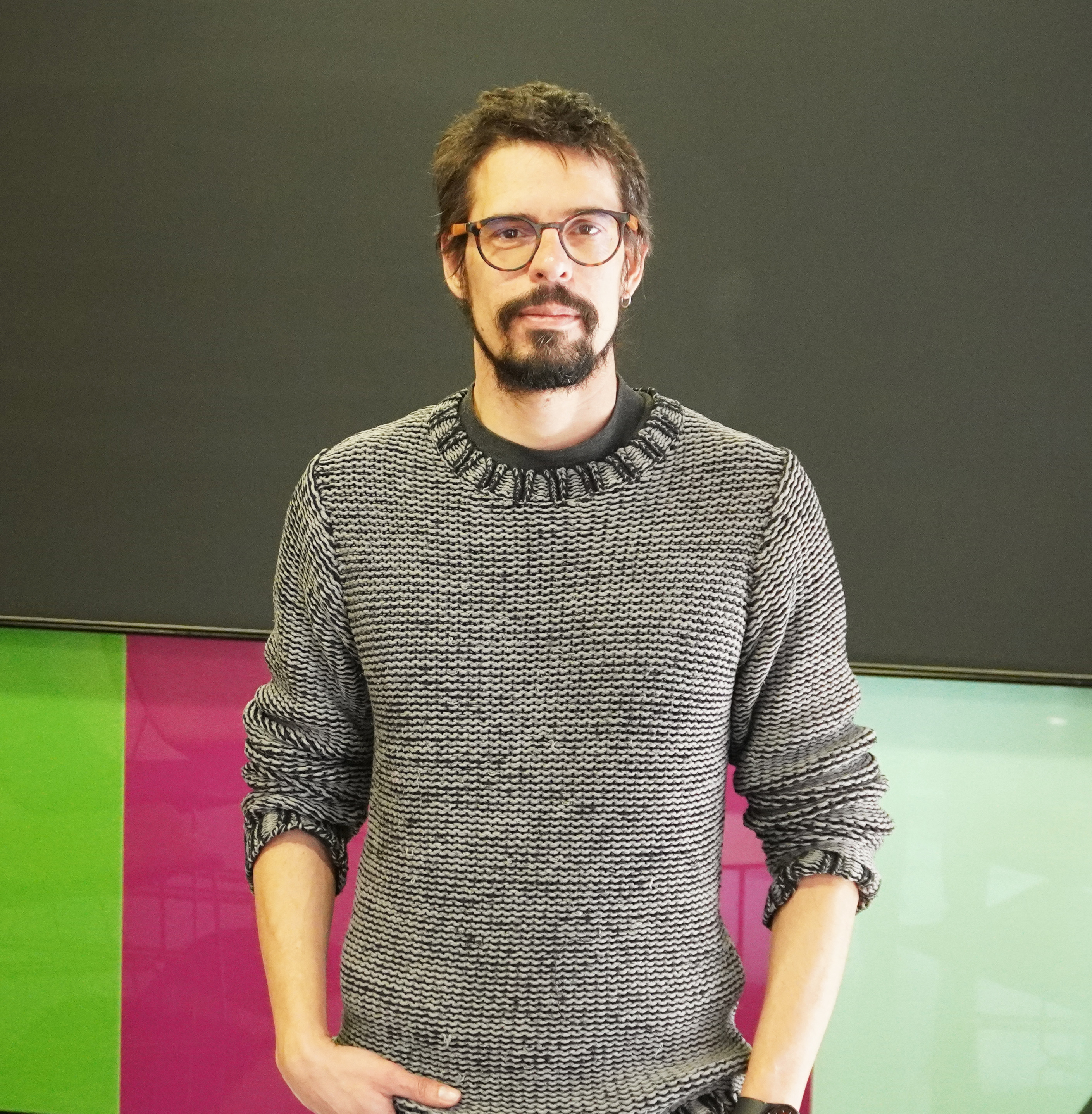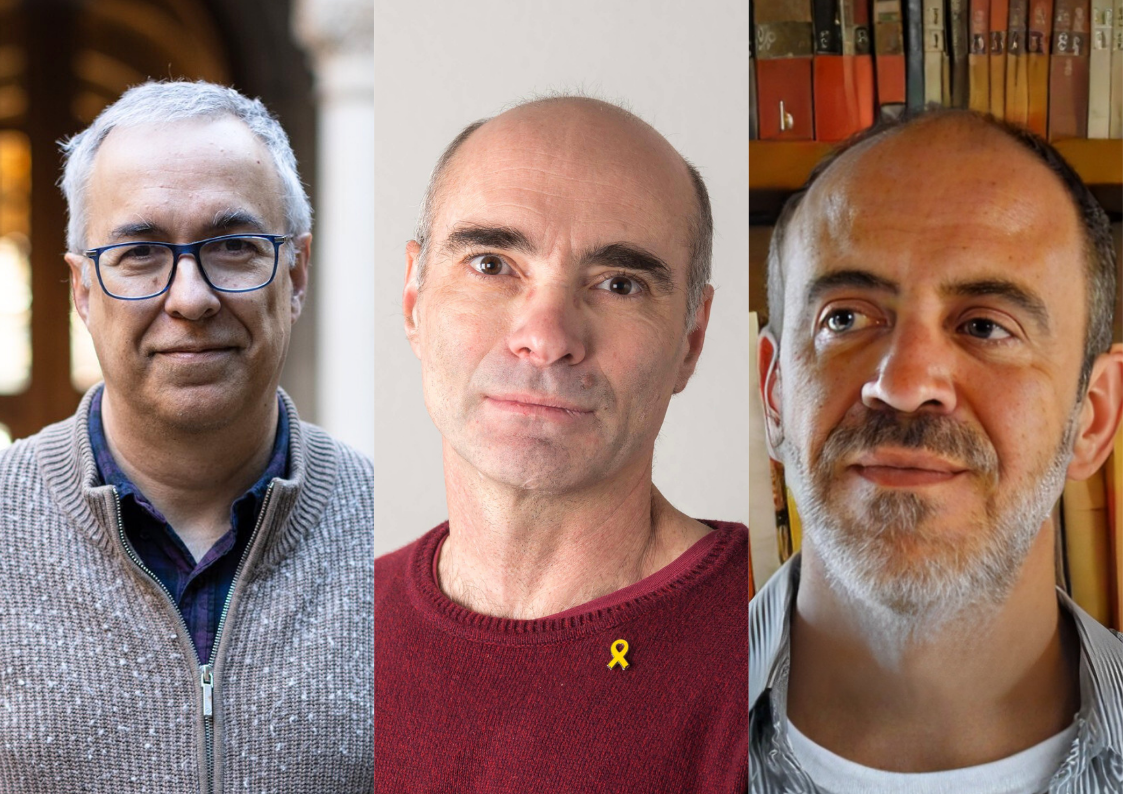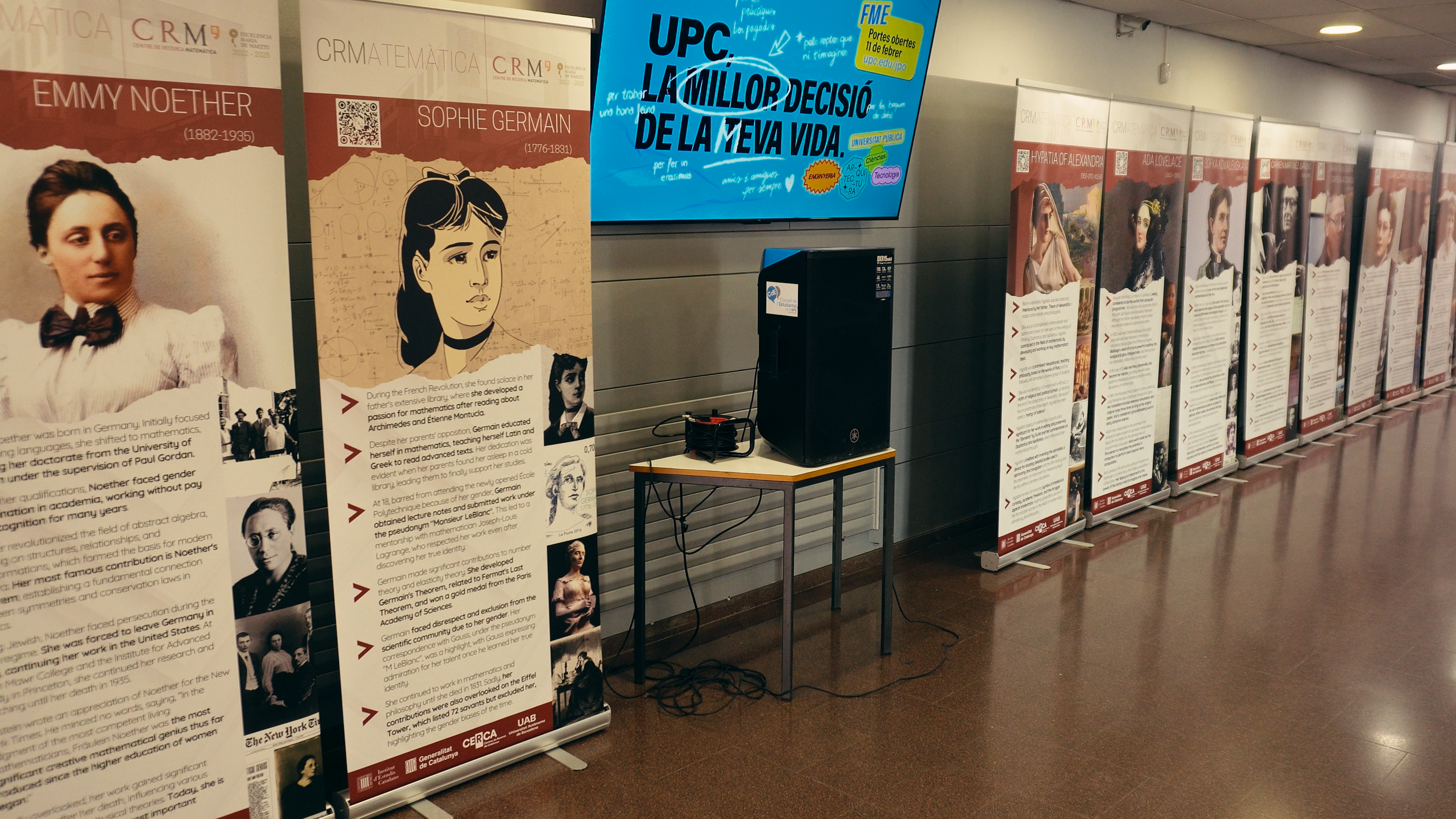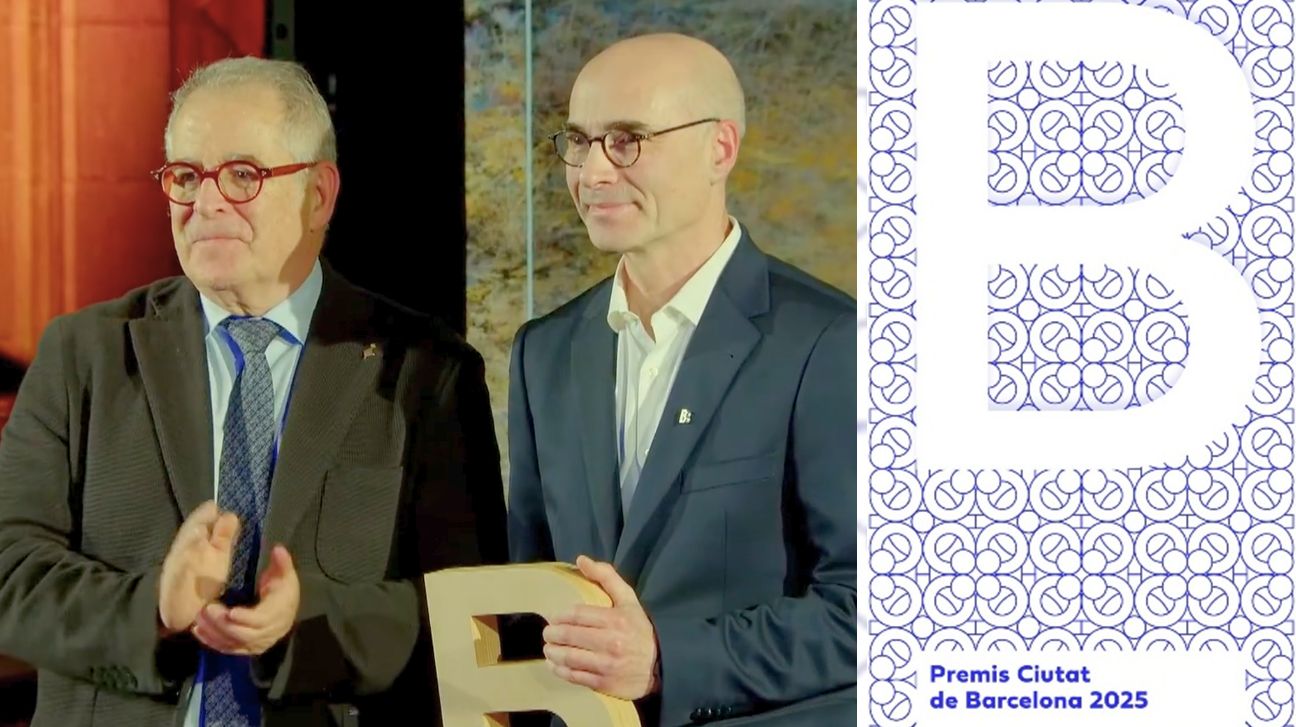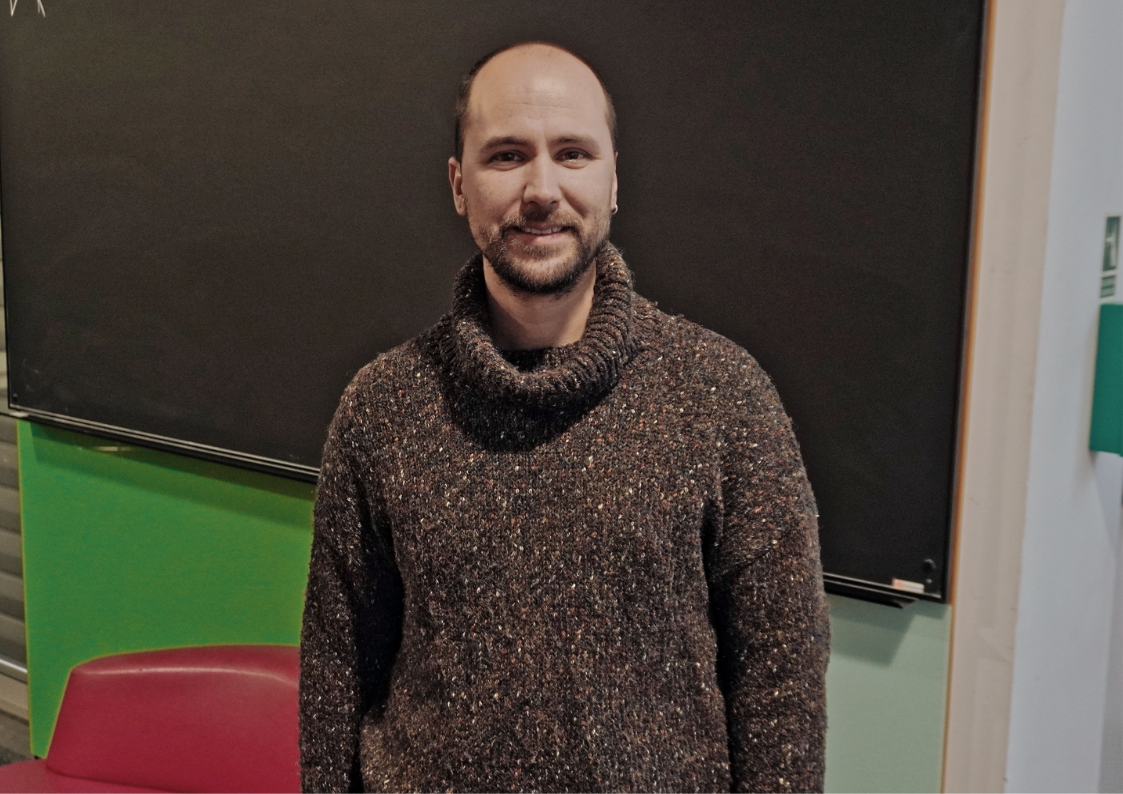The defence will take place in the Auditorium of the CRM on Wednesady, March 30th, 2022.
Daria Stepanova has conducted her PhD project as part of the Cancer Modelling Research Group at CRM, under the supervision of Tomás Alarcón (CRM, ICREA), Helen Byrne (Mathematical Institute, University of Oxford) and Philip Maini (Mathematical Institute, University of Oxford).
PhD Thesis Title: Mathematical modelling of angiogenesis as an integrated multicellular process
Abstract: Angiogenesis, the formation of new blood vessels from pre-existing ones, is essential for normal development and plays a crucial role in such pathologies as cancer, diabetes and atherosclerosis. In spite of its extensive research, many aspects of how new vessels sprout from existing vasculature remain unclear. Recent experimental results indicate that endothelial cells, lining the inner walls of blood vessels, rearrange within growing vessels and that sprout elongation is dominated by cell mixing during the early stages of angiogenesis. Cell rearrangements have been shown to be regulated by dynamic adaptation of cell gene expression, or cell phenotype. However, most theoretical models of angiogenesis do not account for these phenomena and instead assume that cell positions are fixed and cell phenotype is irreversible during sprouting.
In this thesis, we formulate a multiscale model of angiogenic sprouting driven by dynamic cell rearrangements. Our model accounts for cell mixing which is regulated by a stochastic model of subcellular signalling linked to phenotype switching. We initially focus on early angiogenic sprouting when the effects of cell proliferation are negligible. We validate our model against available experimental data. We then use it to develop a measure to quantify the amount of cell rearrangement that occurs during sprouting and investigate how the branching structure of vascular networks changes as the level of cell mixing varies. Our results suggest that cell shuffling directly affects the morphology of growing vasculatures. In particular, rearrangements of endothelial cells with distinct phenotypes can drive changes in the network structure since cell phenotype adaptation is slower than cell migration. Cell mixing also contributes to remodelling of the extracellular matrix which, in turn, guides vascular growth.
In order to investigate the effects of cell proliferation, which operates on longer timescales than cell migration, we first develop a method, based on large deviation theory, which allows us to reduce the computational complexity of our hybrid multiscale model by coarse-graining the internal dynamics of its cell-agents. The coarse-graining (CG) method is applicable to systems in which agent behaviour is described by stochastic systems with multiple stable steady states. The CG technique reduces the original stochastic system to a Markov jump process on the space of its stable steady states. Our CG method preserves the original description of agent states (instead of converting them to discrete ones) and stochastic transitions between them, while considerably reducing the computational complexity of model simulations.
After formulating the CG method for a general class of hybrid models, we illustrate its potential by applying it to our model of angiogenesis. We coarse-grain the subcellular model, which determines cell phenotype specification. This substantially reduces the computational cost of simulations. We then extend our model to account for cell proliferation and validate it using available experimental data. This framework allows us to study network growth on timescales associated with angiogenesis in vivo and to investigate how varying the cell proliferation rate affects network growth.
Summarising, this work provides new insight into the complex cell behaviours that drive angiogenic sprouting. At the same time, it advances the field of theoretical modelling by formulating a coarse-graining method, which paves the way for a systematic reduction of hybrid multiscale models.

CRM Comm Team
Anna Drou | Paula Lomascolo | Pau Varela
CRMComm@crm.cat
Trivial matemàtiques 11F-2026
Rescuing Data from the Pandemic: A Method to Correct Healthcare Shocks
When COVID-19 lockdowns disrupted healthcare in 2020, insurance companies discarded their data; claims had dropped 15%, and patterns made no sense. A new paper in Insurance: Mathematics and Economics shows how to rescue that information by...
El CRM Faculty Colloquium inaugural reuneix tres ponents de l’ICM 2026
Xavier Cabré, Joaquim Ortega-Cerdà i Xavier Tolsa, tots tres convidats a parlar al Congrés Internacional de Matemàtics del 2026, protagonitzaran la primera edició del nou col·loqui trimestral del Centre el 19 de febrer.El Centre de Recerca...
L’exposició “Figures Visibles” s’inaugura a la FME-UPC
L'exposició "Figures Visibles", produïda pel CRM, s'ha inaugurat avui al vestíbul de la Facultat de Matemàtiques i Estadística (FME) de la UPC coincidint amb el Dia Internacional de la Nena i la Dona en la Ciència. La mostra recull la trajectòria...
Xavier Tolsa rep el Premi Ciutat de Barcelona per un resultat clau en matemàtica fonamental
L’investigador Xavier Tolsa (ICREA–UAB–CRM) ha estat guardonat amb el Premi Ciutat de Barcelona 2025 en la categoria de Ciències Fonamentals i Matemàtiques, un reconeixement que atorga l’Ajuntament de Barcelona i que enguany arriba a la seva 76a edició. L’acte de...
Axel Masó Returns to CRM as a Postdoctoral Researcher
Axel Masó returns to CRM as a postdoctoral researcher after a two-year stint at the Knowledge Transfer Unit. He joins the Mathematical Biology research group and KTU to work on the Neuromunt project, an interdisciplinary initiative that studies...

